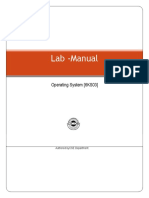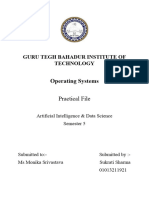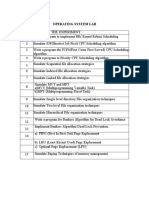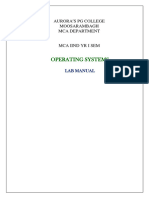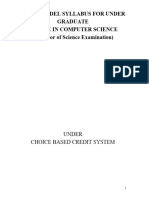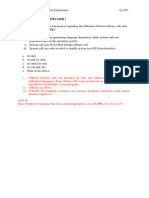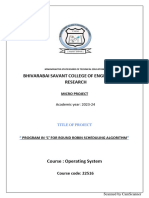0% found this document useful (0 votes)
29 views4 pagesOS Lab Experiments
The document describes 6 experiments related to CPU and disk scheduling algorithms. The experiments include implementing FCFS, SJF, priority, round robin CPU scheduling and disk scheduling algorithms. Code snippets and explanations of the algorithms are provided.
Uploaded by
ronakraj193Copyright
© © All Rights Reserved
We take content rights seriously. If you suspect this is your content, claim it here.
Available Formats
Download as PDF, TXT or read online on Scribd
0% found this document useful (0 votes)
29 views4 pagesOS Lab Experiments
The document describes 6 experiments related to CPU and disk scheduling algorithms. The experiments include implementing FCFS, SJF, priority, round robin CPU scheduling and disk scheduling algorithms. Code snippets and explanations of the algorithms are provided.
Uploaded by
ronakraj193Copyright
© © All Rights Reserved
We take content rights seriously. If you suspect this is your content, claim it here.
Available Formats
Download as PDF, TXT or read online on Scribd
/ 4
You might also like
- No ratings yetRaj Os Lab Manualjkkkkkkkkkkkkkkkkkkkkkkkkkkkkkkkkkkkkkkkkkkkkkkkkkkkkkkkkkkkkkkkkkkkkkkkkkkkkkkkkkkkkkkkkkkkkkkkkkkkkkkkkkkkkkgggggggggggggggggggggggggggggggggggggggggggggggggggggggggggggggggggggggggggggggggggggggggggggggggggggggggggggggggggggggggggggggggggggggggggggggggggggggggggggggggggggggggggggggggggggggggggg11321F005511321F005511321F005511321F005511321F005511321F005511321F005511321F005511321F005511321F005511321F005511321F005511321F005511321F005511321F005511321F005511321F005511321F005511321F005511321F005511321F005511321F005511321F005511321F005511321F005511321F005511321F005511321F005511321F005511321F005511321F005511321F005511321F005511321F005511321F005511321F005511321F005511321F005511321F005511321F005511321F005511321F005511321F005511321F005511321F005511321F005511321F005511321F005511321F005511321F005511321F005511321F005511321F005511321F005511321F005511321F005511321F005511321F005511321F005511321F005511321F005511321F005511321F005511321F005511321F005511321F005511321F005511321F00551132116 pages







